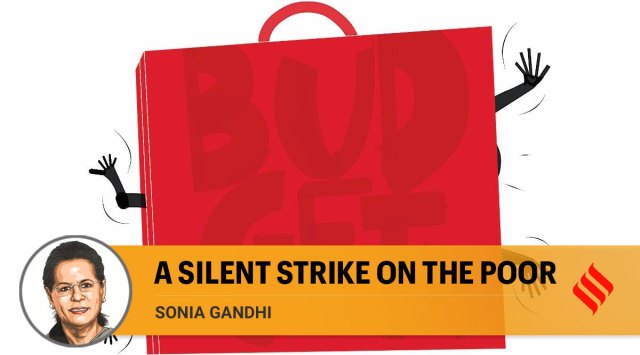
In the recently-concluded Bharat Jodo Yatra, yatris walked from Kanyakumari to Kashmir and interacted with lakhs of Indians from all walks of life. The voices they heard expressed deep economic distress and widespread disappointment about the direction in which India is headed. Whether poor or middle class, rural or urban, Indians are being punished by the triple menace of price rise, unemployment and falling incomes.
The 2023-24 Budget not only fails to address these critical challenges, but also worsens them by slashing allocations meant for the poor and the vulnerable. It is a silent strike on the poor by the Modi government, hitting at the heart of all far-reaching rights-based legislation enacted by the UPA government during 2004-14.
The promise of Independence was of a good life for every Indian, not only to satisfy their basic needs but to have equal opportunities to empower themselves socially, economically, and politically. The rights-based legislation of the UPA era was a deliberate, cohesive step towards this goal. Rights-based laws empower citizens, and ensure it is the government’s duty to deliver — on education, food, work, and nutrition. The Prime Minister makes no secret of his dislike for all this talk of rights. He began by ridiculing them in Parliament but was forced to rely on them during Covid-19. With this budget, he has now rolled back funding to lows not seen in over a decade.
Rural labourers will have less work, as funding for MGNREGA has been reduced by a third, bringing it below 2018-19 levels. Wages under the scheme are deliberately being kept below market rates, and workers struggle to get paid on time.
Our schools will be strapped for resources, with funding for the rebranded Sarva Shiksha Abhiyan remaining stagnant for three years in a row. Children will have less nutritious meals, as funding for mid-day meals in schools has fallen by a tenth this year. Rations to the poor have been halved since the 5 kg of free foodgrain under the PM Garib Kalyan Anna Yojana has been arbitrarily stopped. Similarly, schemes for minorities, the disabled, and pensions for the elderly, have all been summarily reduced.
In addition, the rise in prices over the past four years means that every rupee buys about a quarter less than it did in 2018. This deadly combination of insufficient funding and rising inflation directly hurts our nation’s poorest and most disadvantaged.
This silent attack comes at a time when our economic situation continues to be distressing. The Economic Survey cheerily declares “recovery complete”, since GDP has touched pre-pandemic levels. But only the richest Indians enjoy the benefits of this recovery. According to the RBI’s consumer surveys, the majority of people think economic conditions have been worsening every month since November 2019. The causes are plain to see — prices of daily commodities have continuously risen and the Modi government has failed to generate jobs, especially for the youth. People are forced to spend more on daily essentials, even as their incomes shrink.
As expected, there has been total silence from the Prime Minister on why this attack on social schemes was needed during this crisis. Reading between the lines, we understand that the rationale is to fund capital expenditure, which the budget has sharply increased. Experts have raised doubts about the credibility of the figures, whether the funding can be well spent, and are wary that a large portion of the funding may reach only the government’s friends and cronies. However, even setting these doubts aside, there is a larger point — funding infrastructure at the expense of human development is a mistake, both in the short term and long term.
Social programmes directly improve people’s lives by providing work, meals, better learning, affordable healthcare, or cash in their hands. Helping people directly is surer and faster, compared to the uncertain hope that the spending on large capital-intensive projects will eventually trickle down to the people at large. In the long term, history teaches us that a healthy and educated population is the foundation for prosperity. A prosperous country, of course, needs highways, railways, ports and electricity; but it also needs skilled workers to operate them, scientists and innovators to respond to the challenges of the times, farmers to feed everyone, teachers, doctors, lawyers, artists and many more who work to enrich the lives of their fellow citizens. Sharp cuts to social security, education, nutrition and health hurt the poorest today, and stunt our progress tomorrow.
The Prime Minister’s policy to benefit his few rich friends at the expense of poor and middle-class Indians has led to continuous disasters — from demonetisation to a badly-designed GST hurting small businesses, to the failed attempt to bring about the three farm laws and the subsequent neglect of agriculture. Destructive privatisation has handed over priceless national assets to selected private hands cheaply, leading to unemployment, especially for the SCs and STs. Even the hard-earned savings of crores of poor and middle-class Indians are threatened as the government forces trusted public institutions like LIC and SBI to invest in poorly-managed companies owned by its chosen friends.
Bereft of ideas, the Prime Minister and his ministers are resorting to loud chants of “vishwaguru’ and “Amrit Kaal”, even as financial scandals erupt over the PM’s favourite and favoured businessman. This will be of scant help to crores of vulnerable Indians worried about their livelihoods, savings and futures.
Thankfully, the people of India will not fall for this propaganda. It is now the duty of every like-minded Indian to join hands, oppose this government’s harmful actions, and together build the change which people long to see.
Sonia Gandhi is Chairperson of the Congress Parliamentary Party